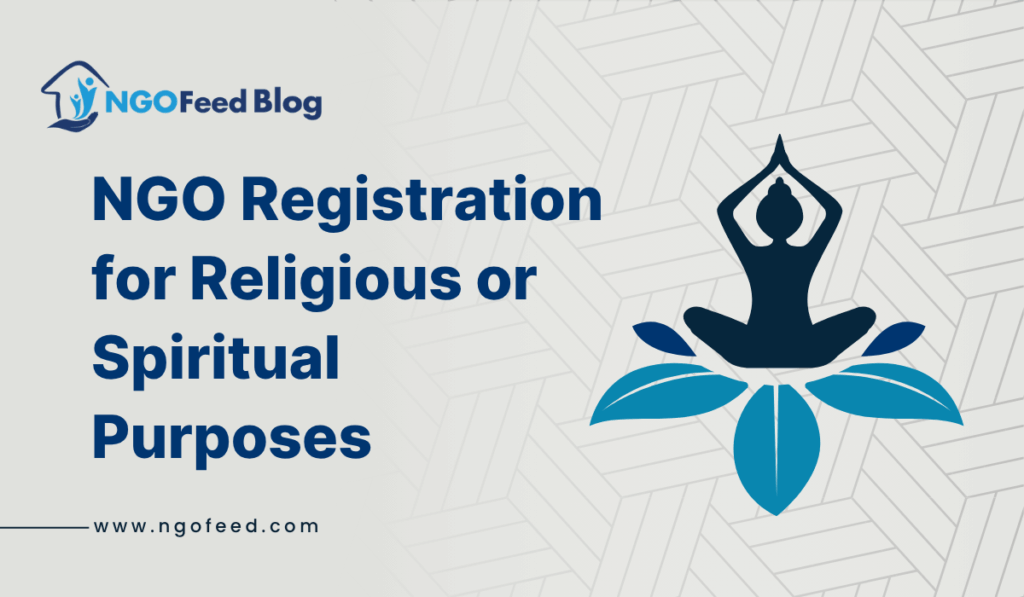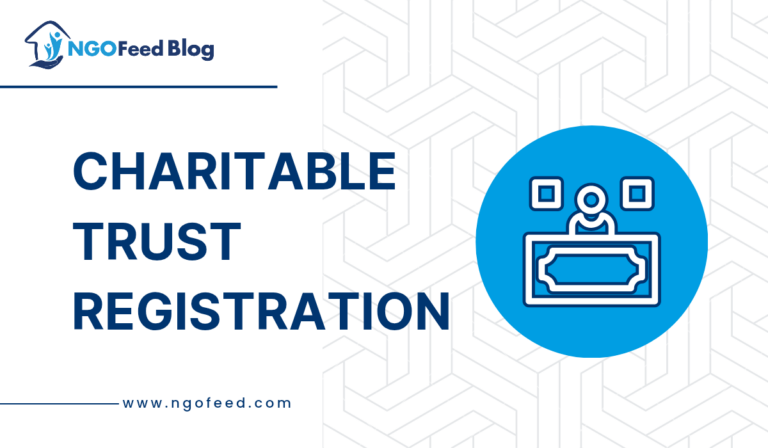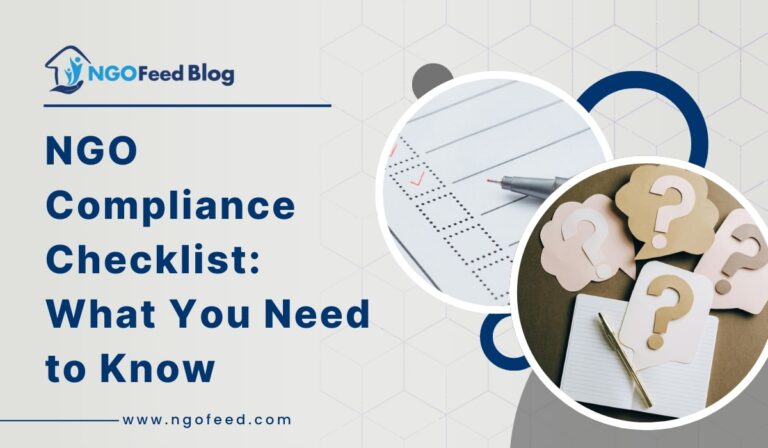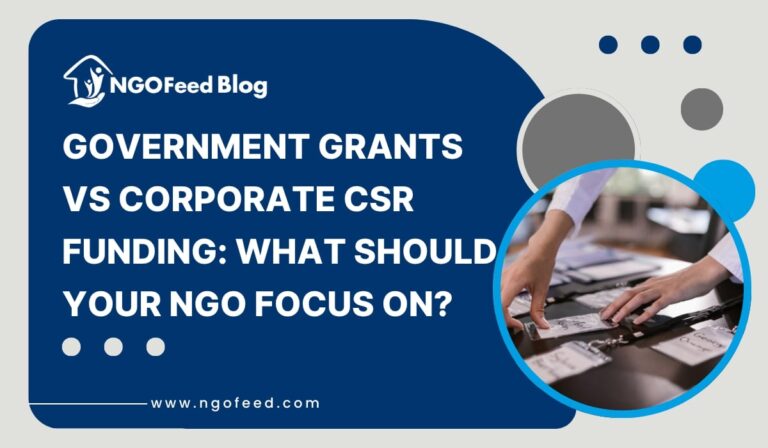NGO Registration for Religious or Spiritual Purposes: Non-Governmental Organizations (NGOs) serve as crucial agents of social change, and many are founded with religious or spiritual objectives. These organizations aim to promote values, conduct spiritual discourses, build places of worship, or support faith-based community development. However, registering an NGO with religious or spiritual aims in India comes with specific legal guidelines, restrictions and obligations that must be carefully understood.
This article provides a comprehensive guide to NGO registration in India for religious or spiritual purposes, along with relevant rules, limitations, and compliance requirements.
Table of Contents
1. Understanding Religious or Spiritual NGOs
A religious or spiritual NGO is an organization whose primary objective revolves around the promotion of religious beliefs, practices, and spirituality. These may include:
What is a Religious/Spiritual NGO?
- Spreading spiritual teachings
- Managing temples, churches, mosques, or ashrams
- Conducting prayer meetings, festivals, and retreats
- Publishing spiritual literature
- Promoting interfaith harmony
Also Read: Cultural Appropriation Vs Cultural Respect in NGO Campaigns
Why Legal Structure Matters
The legal structure of an NGO determines its governance, funding eligibility, and operational framework. For religious or spiritual NGOs, the right registration framework ensures lawful functioning and protection from legal scrutiny.
Legal Frameworks for NGO Registration
Religious or spiritual NGOs in India can be registered under various legal acts, depending on their objectives and operational scope.
The Indian Trusts Act, 1882
- Most common for religious/spiritual NGOs.
- A trust can be created by executing a trust deed.
- Minimum two trustees required (in most states).
- Trusts can be either private (for specific individuals) or public (for general public or religious causes).
- Registration with the local Sub-Registrar is required.
Suitability: Ideal for religious/spiritual organizations managing temples, ashrams, or charitable religious events.
Societies Registration Act, 1860
- Requires minimum seven members for registration.
- Societies are governed by their Memorandum of Association (MoA) and Rules & Regulations.
- Must be registered with the Registrar of Societies in the respective state.
Suitability: Best for faith-based groups engaging in religious awareness, education, or interfaith dialogue.
Also Read: FCRA Rules 2025: What Every NGO in India Must Know
Section 8 Company under Companies Act, 2013
- Requires at least two directors and members.
- Must apply to the Registrar of Companies (RoC) with a license under Section 8.
- Cannot distribute profits to members.
- More regulated and formal in structure.
Suitability: Suitable for professionally-run spiritual or religious organizations planning for national or international outreach.
Key Restrictions and Compliance Norms
While forming an NGO for religious or spiritual purposes is legally permitted, there are several restrictions and compliance measures imposed by Indian law.
Foreign Contribution Regulation Act (FCRA), 2010
- NGOs receiving foreign donations must obtain FCRA registration or prior permission.
- Religious or spiritual NGOs face stricter scrutiny to ensure funds are not misused for religious conversion or political purposes.
- Funds cannot be used to incite communal disharmony.
Key Rule: FCRA prohibits the use of foreign funds for activities that may affect public interest or religious harmony.
Also Read: Values Driven Fundraising
Income Tax Exemptions and Section 80G
- Registered NGOs can apply for 12A (income tax exemption) and 80G (donor tax benefit).
- However, if the organization promotes a particular religion exclusively, it may not qualify for 80G benefits.
- Religious activity must be secondary to charitable activity to claim tax exemptions.
Rule of Thumb: Purely religious institutions may not be eligible for certain tax benefits; a mix of charitable and religious activities improves eligibility.
Anti-Conversion Laws and State Restrictions
- Some Indian states have stringent anti-conversion laws.
- NGOs promoting spirituality must ensure that their programs are not seen as coercive or incentivized religious conversions.
- Legal action may be taken if religious activities are viewed as violating public order or promoting disharmony.
Drafting the Governing Documents Carefully
Trust Deed or Memorandum of Association (MoA)
- Clearly define the spiritual or religious nature of the organization.
- Mention specific objectives: teaching, discourse, publication, etc.
- Avoid language suggesting exclusivity or conversion.
Bylaws and Rules
- Include clear operational guidelines.
- Include clauses on conflict of interest, transparency in fund usage, and internal audits.
- Clearly mention whether funds will be used for public charity, relief, or only religious rites.
Also Read: NGO Darpan Registration
Permissible Activities and Grey Areas
Permissible Activities
- Spiritual education workshops
- Yoga and meditation camps
- Religious publication and literature distribution
- Organizing non-political, non-conversion-based religious gatherings
Activities under Scrutiny
- Conversion campaigns or incentivized religious conversions
- Political lobbying in the name of religion
- Hate speech or anti-secular messaging
- Misuse of foreign funds for religious expansion
Best Practices for Compliance and Transparency
Financial Transparency
- Maintain audited financial statements annually.
- Clearly separate religious and non-religious expenses.
- Provide donor transparency to ensure trust.
Regulatory Filings
- Timely submission of IT returns, annual reports, and FCRA filings (if applicable).
- Regular updates to Registrar for any changes in governing body or address.
Avoid Political Affiliations
- NGOs with religious motives should steer clear of political affiliations.
- Engaging in political campaigning or ideological promotion is not allowed.
Also Read: Society Registration Process in India
Real-World Examples and Precedents
Many respected spiritual and religious organizations in India operate legally and efficiently, including:
- Ramakrishna Mission – Registered as a charitable trust promoting education and spiritual welfare.
- Art of Living Foundation – A Section 8 Company engaged in spiritual education, meditation, and humanitarian work.
- ISKCON (International Society for Krishna Consciousness) – Registered as a society focusing on devotional service, education, and public welfare.
These organizations demonstrate how religious goals can coexist with social responsibility and legal compliance.
Challenges Faced by Religious/Spiritual NGOs
- FCRA Cancellation Risks: Several NGOs have had their FCRA licenses canceled due to alleged misuse.
- Public Perception: Accusations of conversion, political lobbying, or communal propaganda can damage reputation.
- Ineligibility for Tax Benefits: If the activities are solely religious, exemption under 80G might be denied.
Also Read: Top 10 Government Schemes For NGOs
Conclusion
Registering an NGO with religious or spiritual purposes is a legitimate and respected path for serving communities and promoting values. However, it is subject to careful legal navigation, especially with respect to foreign funding, taxation and public order. Choosing the right legal structure, drafting precise governing documents, and staying within the bounds of law are essential to operate without hindrance.
Faith-based organizations can make a lasting impact if they embrace transparency, inclusiveness and compliance while staying rooted in their spiritual missions. Proper registration and adherence to rules help these NGOs function effectively while maintaining trust with donors, beneficiaries and the government.









